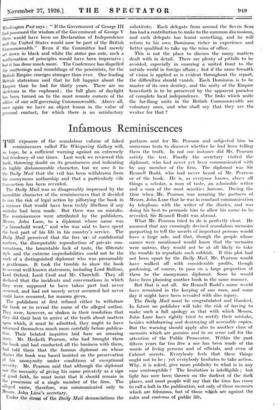Infamous Reminiscences
THE exposure of the scandalous volume of faked I reminiscences called The Whispering Gallery will, we hope, be a sufficient warning against an extremely bad tendency of our times. Last week we reviewed this book, throwing doubt on its_ genuineness and indicating its highly 1 dishonourable chaiacter, but we owe it. to the Daily Mail that the veil has been withdrawn from the anonymous authorship and that a particularly vile transaction has been revealed.
The Daily Mail was so disagreeably. impressed by the incredible character of the reminiscences that it decided to run the risk of legal action by pillorying the book in a manner that would have been trebly libellous..if any mistake had been made. But there was no mistake. The reminiscences were attributed by the publishers, Itessrs. John Lane, to a diplomat whose name was "a household word," and who was said to have spent the best part of his life in his country's service. The Daily Mail perceived that the free us2 of confidential matters, the disreputable reproduction of private con- versations, the lamentable lack of taste, the illiterate style and the extreme improbabilities could not be the work of a distinguished diplomat who was presumably a gentleman. It took the trouble to show the book to several well-known statesmen, including Lord Balfour, Lord Oxford, Lord CeCil and Mr. Churchill. They all declared that the incidents and conversations in which they were supposed to have taken part had never occurred, and had not merely never occurred but never could have occurred, for reasons given.
The publishers at first refused either to withdraw the book or to reveal the name of the alleged author. They were, however, so shaken in their resolution that they did their best to arrive at the truth about matters !Ton which, it must be admitted, they ought to have informed themselves much more carefully before publica- tion. Their belated inquiries laid bare an amazing Story. Mr.- Jiesketh Pearson, who had brought them the book and•hid conducted all the business with them, had told them that the famous diplomat on whose diaries the book was based insisted on the preservation of his anonymity under conditions of exceptional severity. Mr. Pearson said that although the diplomat saw the necessity of giving his name privately as a sign of good faith, he !Mist insist that it should remain in the possession of a single member of the firm. The alleged name, therefore, was communicated only to Messrs. John .Lane's secretary.. Under the stress of the Daily Mail denunciations the partners sent for Mr. Pearson and subjected him to numerous tests to discover whether he had been telling them the truth. In not one instance did Mr. Pearson satisfy the test. Finally the secretary visited the diplomat, who had never yet been communicated with by any. member of the firm. The diplomat was Sir Rennell Rodd, who had never heard . of Mr. Pearson or of the book. He is, as everyone knows, above all things a scholar, a man of taste,. an admirable writer and a man .of the most sqnsitive ,honour. During the time wheuAir—Pearson was assuring the partners of Messrs. John Lane that he was in constant communication by telephone with the writer of the: diaries, and was doing his best to persuade him to allow his name to. be revealed, Sir Rennell Rodd was abroad.
What Mr. Pearson tried to do is perfectly clear. He assumed that any cunningly devised scandalous memoirs purporting to tell the secrets of important persons would have a large sale, and that, though the people whose names were mentioned would know that the 'memoirs were untrue, they would not be at all likely to take the trouble to .repudiate such rubbish. If this plot had not been upset by the Daily Mail, Mr. Pearson would have walked off with considerable profits, though professing, of course, to pass on a large proportion of them to the anonymous diplomat. Soon he would have been planning another book in the same manner.
But that is not all. Sir Rennell Rodd's name would have remained in the keeping of one man, and some day it might have been revealed with dire injury.
The Daily Mail must be congratulated and thanked. In future no publisher will take the risk of having to make such a full apology as that with which Messrs. John Lane have rightly tried to rectify their mistake, besides. withdrawing and destroying all accessible copies. But the warning should apply also to another class of memoirs which are genuine and in no sense call for the attention of the Public Prosecutor. Within the past fifteen years far too free a use has been made of the words of living persons and of officials, and even of Cabinet secrets. Everybody feels that these things ought not to be ; yet everybody hesitates to take action. Why, it is asked, give more publicity to .what is in any case contemptible ? The hesitation is intelligible ; but light has now been thrown on the darkest of the dark places, and most people will say that the time has come to call a halt in .the publication, not only of those memoirs which are felonious, but of those wIthch are against the rules and customs of public life.


















































 Previous page
Previous page